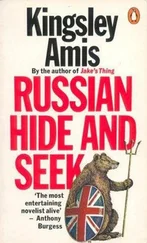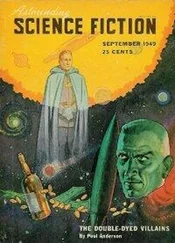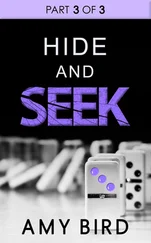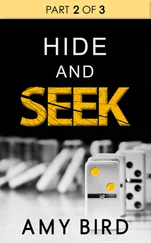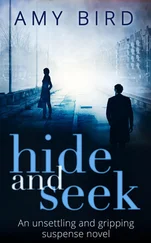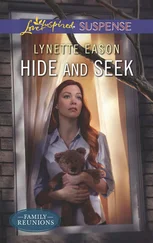Уилки Коллинз - Hide and Seek
Здесь есть возможность читать онлайн «Уилки Коллинз - Hide and Seek» весь текст электронной книги совершенно бесплатно (целиком полную версию без сокращений). В некоторых случаях можно слушать аудио, скачать через торрент в формате fb2 и присутствует краткое содержание. Год выпуска: 2005, Жанр: Классическая проза, на английском языке. Описание произведения, (предисловие) а так же отзывы посетителей доступны на портале библиотеки ЛибКат.
- Название:Hide and Seek
- Автор:
- Жанр:
- Год:2005
- ISBN:нет данных
- Рейтинг книги:5 / 5. Голосов: 1
-
Избранное:Добавить в избранное
- Отзывы:
-
Ваша оценка:
- 100
- 1
- 2
- 3
- 4
- 5
Hide and Seek: краткое содержание, описание и аннотация
Предлагаем к чтению аннотацию, описание, краткое содержание или предисловие (зависит от того, что написал сам автор книги «Hide and Seek»). Если вы не нашли необходимую информацию о книге — напишите в комментариях, мы постараемся отыскать её.
Hide and Seek — читать онлайн бесплатно полную книгу (весь текст) целиком
Ниже представлен текст книги, разбитый по страницам. Система сохранения места последней прочитанной страницы, позволяет с удобством читать онлайн бесплатно книгу «Hide and Seek», без необходимости каждый раз заново искать на чём Вы остановились. Поставьте закладку, и сможете в любой момент перейти на страницу, на которой закончили чтение.
Интервал:
Закладка:
“Oh!” said Zack, “don’t be afraid. It’s not thieving—it’s only barter. Look here, my dear fellow, this is how it is. A friend of mine, a junior clerk in our office, has three dozen cigars, and I have two staring flannel shirts, which are only fit for a snob to wear. The junior clerk gives me the three dozen cigars, and I give the junior clerk the two staring flannel shirts. That’s barter, and barter’s commerce, old boy! it’s all my father’s fault; he will make a tradesman of me. Dutiful behavior, isn’t it, to be doing a bit of commerce already on my own account?”
“I’ll tell you what, Zack,” said Mr. Blyth, “I don’t like the way you’re going on in at all. Your last letter made me very uneasy, I can promise you.”
“You can’t be half as uneasy as I am,” rejoined Zack. “I’m jolly enough here, to be sure, because I can’t help it somehow; but at home I’m the most miserable devil on the face of the earth. My father baulks me in everything, and makes me turn hypocrite, and take him in, in all sorts of ways—which I hate myself for doing; and yet can’t help doing, because he forces me to it. Why does he want to make me live in the same slow way that he does himself? There’s some difference in our ages, I rather think! Why does he bully me about being always home by eleven o’clock? Why does he force me into a tea-merchant’s office, when I want to be an artist, like you? I’m a perfect slave to commerce already. What do you think? I’m supposed to be sampling in the city at this very moment. The junior clerk’s doing the work for me; and he’s to have one of my dress-waistcoats to compensate him for the trouble. First my shirts; then my waistcoat; then my—confound it, sir, I shall be stripped to the skin, if this sort of thing goes on much longer!”
“Gently, Zack, gently. What would your father say if he heard you?”
“Oh, yes! it’s all very well, you old humbug, to shake your head at me; but you wouldn’t like being forced into an infernal tea-shop, and having all your pocket-money stopped, if it was your case. I won’t stand it—I have the patience of Job—but I won’t stand it! My mind’s made up: I want to be an artist, and I will be an artist. Don’t lecture, Blyth—it’s no use; but just tell me how I’m to begin learning to draw.”
Here Zack cunningly touched Valentine on his weak point. Art was his grand topic; and to ask his advice on that subject was to administer the sweetest flattery to his professional pride. He wheeled his chair round directly, so as to face young Thorpe. “If you’re really set on being an artist,” he began enthusiastically, “I rather fancy, Master Zack, I’m the man to help you. First of all, you must purify your taste by copying the glorious works of Greek sculpture—in short, you must form yourself on the Antique. Look there!—just what Madonna’s doing now; she’s forming herself on the Antique.”
Zack went immediately to look at Madonna’s drawing, the outline of which was now finished. “Beautiful! Splendid! Ah! confound it! yes! the glorious Greeks, and so forth, just as you say, Blyth. A most wonderful drawing! the finest thing of the kind I ever saw in my life!” Here he transferred his superlatives to his fingers, communicating them to Madonna through the medium of the deaf and dumb alphabet, which he had superficially mastered with extraordinary rapidity under Mr. and Mrs. Blyth’s tuition. Whatever Zack’s friends did Zack always admired with the wildest enthusiasm, and without an instant’s previous consideration. Any knowledge of what he praised, or why he praised it, was a slight superfluity of which he never felt the want. If Madonna had been a great astronomer, and had shown him pages of mathematical calculations, he would have overwhelmed her with eulogies just as glibly as—by means of the finger alphabet—he was overwhelming her now.
But Valentine’s pupil was used to be criticized as well as praised; and her head was in no danger of being turned by Zack’s admiration of her drawing. Looking up at him with a sly expression of incredulity, she signed these words in reply:—“I am afraid it ought to be a much better drawing than it is. Do you really like it?” Zack rejoined impetuously by a fresh torrent of superlatives. She watched his face, for a moment, rather anxiously and inquiringly, then bent down quickly over her drawing. He walked back to Valentine. Her eyes followed him—then returned once more to the paper before her. The color began to rise again in her cheek; a thoughtful expression stole calmly over her clear, happy eyes; she played nervously with the port-crayon that held her black and white chalk; looked attentively at the drawing; and, smiling very prettily at some fancy of her own, proceeded assiduously with her employment, altering and amending, as she went on, with more than usual industry and care.
What was Madonna thinking of? If she had been willing, and able, to utter her thoughts, she might have expressed them thus: “I wonder whether he likes my drawing? Shall I try hard if I can’t make it better worth pleasing him? I will! it shall be the best thing I have ever done. And then, when it is nicely finished, I will take it secretly to Mrs. Blyth to give from me, as my present to Zack.”
“Look there,” said Valentine, turning from his picture towards Madonna, “look, my boy, how carefully that dear good girl there is working from the Antique! Only copy her example, and you may be able to draw from the life in less than a year’s time.”
“You don’t say so? I should like to sit down and begin at once. But, look here, Blyth, when you say ‘draw from the life,’ there can’t be the smallest doubt, of course, about what you mean—but, at the same time, if you would only be a little less professional in your way of expressing yourself—”
“Good heavens, Zack, in what barbarous ignorance of art your parents must have brought you up! ‘Drawing from the life,’ means drawing the living human figure from the living human being which sits at a shilling an hour, and calls itself a model.”
“Ah, to be sure! Some of these very models whose names are chalked up here over your fireplace?—Delightful! Glorious! Drawing from the life—just the very thing I long for most. Hullo!” exclaimed Zack, reading the memoranda, which it was Mr. Blyth’s habit to scrawl, as they occurred to him, on the wall over the chimney-piece—“Hullo! here’s a woman-model; ‘Amelia Bibby’—Blyth! let me dash at once into drawing from the life, and let me begin with Amelia Bibby.”
“Nothing of the sort, Master Zack,” said Valentine. “You may end with Amelia Bibby, when you are fit to study at the Royal Academy. She’s a capital model, and so is her sister, Sophia. The worst of it is, they quarreled mortally a little while ago; and now, if an artist has Sophia, Amelia won’t come to him. And Sophia of course returns the compliment, and won’t sit to Amelia’s friends. It’s awkward for people who used to employ them both, as I did.”
“What did they quarrel about?” inquired Zack.
“About a tea-pot,” answered Mr. Blyth. “You see, they are daughters of one of the late king’s footmen, and are desperately proud of their aristocratic origin. They used to live together as happy as birds, without a hard word ever being spoken between them, till, one day, they happened to break their tea-pot, which of course set them talking about getting a new one. Sophia said it ought to be earthenware, like the last; Amelia contradicted her, and said it ought to be metal. Sophia said all the aristocracy used earthenware; Amelia said all the aristocracy used metal. Sophia said she was oldest, and knew best; Amelia said she was youngest, and knew better. Sophia said Amelia was an impudent jackanapes; Amelia said Sophia was a plebeian wretch. From that moment, they parted. Sophia sits in her own lodging, and drinks tea out of earthenware; Amelia sits in her own lodging, and drinks tea out of metal. They swear never to make it up, and abuse each other furiously to everybody who will listen to them. Very shocking, and very curious at the same time—isn’t it, Zack?”
Читать дальшеИнтервал:
Закладка:
Похожие книги на «Hide and Seek»
Представляем Вашему вниманию похожие книги на «Hide and Seek» списком для выбора. Мы отобрали схожую по названию и смыслу литературу в надежде предоставить читателям больше вариантов отыскать новые, интересные, ещё непрочитанные произведения.
Обсуждение, отзывы о книге «Hide and Seek» и просто собственные мнения читателей. Оставьте ваши комментарии, напишите, что Вы думаете о произведении, его смысле или главных героях. Укажите что конкретно понравилось, а что нет, и почему Вы так считаете.


